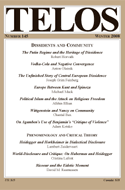Each Tuesday in the TELOSscope blog, we reach back into the archives and highlight an article whose critical insights continue to illuminate our thinking and challenge our assumptions. Today, Lev Marder looks at David M. Rasmussen’s “Preserving the Eidetic Moment: A Contribution of Phenomenology to Critical Theory,” from Telos 145 (Winter 2008).
 As with Paul Ricouer’s work, David M. Rasmussen’s article “Preserving the Eidetic Moment: A Contribution of Phenomenology to Critical Theory,” from Telos 145, can be praised for refusing to think of theory and praxis in oppositional terms and for preserving the eidetic moment. Relying on his vast experience with the living works he engages and with the theorists of the phenomenological/hermeneutical and critical theory traditions, Rasmussen’s essay exemplifies how theory blends into praxis and praxis into theory. Deliberately injecting subjectivity into an essay that most theorists would claim requires a “scientific” approach, he refuses to hide the subjectivity at the essence of all expression. Where was subjectivity lost in Western thought’s understanding of identity and why should it, why can it, be recovered?
As with Paul Ricouer’s work, David M. Rasmussen’s article “Preserving the Eidetic Moment: A Contribution of Phenomenology to Critical Theory,” from Telos 145, can be praised for refusing to think of theory and praxis in oppositional terms and for preserving the eidetic moment. Relying on his vast experience with the living works he engages and with the theorists of the phenomenological/hermeneutical and critical theory traditions, Rasmussen’s essay exemplifies how theory blends into praxis and praxis into theory. Deliberately injecting subjectivity into an essay that most theorists would claim requires a “scientific” approach, he refuses to hide the subjectivity at the essence of all expression. Where was subjectivity lost in Western thought’s understanding of identity and why should it, why can it, be recovered?
Dissolved in Hegel’s language of exchange and its claim to universality, which are maintained in Habermas’s work, subjectivity is presented as inessential to understanding identity. Since the language of exchange leads to self-identity synonymous with sameness, it sets the volatile content of critical theory in opposition to its established method. If particularity essential to identity cannot be retained in the language of exchange, that does not mean that it can reduced out of understanding. How can the delicate task of not reducing knowledge to instrumentalism, while not reducing subjectivity out of knowledge, be accomplished? If Ricoeur’s theory of narrative identity upholds the universality of language, while drawing attention to the eidetic moment accompanying the temporarily of narrative, it perhaps offers the intersection of critical theory and phenomenology as the site of identity. Rasmussen’s essay not only traces the plight of subjectivity from Hegel’s work to critical theory, but also points to the necessity of its recovery in Ricoeur’s work and beyond. Complementing language with temporality, and critical theory with phenomenology, identity is resuscitated by the eidetic moment, giving it new life. But why should identity infused with subjectivity be brought back to the world of understanding, which rejected it? Is the world studied by critical theory and phenomenology begging for subjectivity to be recovered? Perhaps this glimpse into Rasmussen’s thought provides a hint:
Two problems emerge: (1) diversity of cultures and nations requires sensitivity to difference on a global scale; and (2) given the necessity for universal human rights, it is imperative that everyone be treated equally. We might call this the “paradox of global justice.” How is it possible to acknowledge the distinctiveness of other political cultures while at the same time granting legitimacy and validity to individual claims for rights? This dilemma is made more complex when, as we move beyond the confines of the nation-state, the rights of individuals somehow transcend nationality. The concept of narrative identity developed in Self as Another preserves the non-identical relation between self and self, and between self and other. This is a paradigm that might be used to enable an encounter with non-Western or non-democratic cultures that would allow for sufficient difference so that the identity of the other is not reduced to the identity of the self. The result would be the preservation of a certain asymmetry of interpretation. In Ricoeur’s book The Just, narrative identity has precisely this function. (187–88)
In the fusion of theory and praxis, bringing together critical theory and phenomenology, while maintaining universality and the eidetic moment, Rasmussen’s essay is an indispensable contribution to identity theory. Drawing insightful connections and giving them ethical meaning, Rasmussen’s essay can be valuable not only to critical theory and phenomenology, but broadly speaking, to the resistance to reductionism.
Read the full version of David M. Rasmussen’s “Preserving the Eidetic Moment: A Contribution of Phenomenology to Critical Theory” at the TELOS Online website. If you are affiliated with an institution that is an online subscriber to Telos, you have free access to our complete online archive. If not, you can purchase 24-hour access to this and other Telos articles at the low rate of $5/article.



